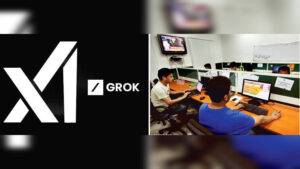No Cause for Celebration in Grok’s Reaction: The Importance of Human Connection Over AI

The Impact of AI on Human Creativity and Critical Thinking
Understanding the Influence of AI
Walt Whitman once celebrated the wonder of both light and darkness, suggesting the miraculous nature of existence. However, in today’s world, the role of artificial intelligence (AI) has raised questions about how we value human creativity and critical thinking. Are we beginning to prioritize AI-generated ideas over our own unique perspectives? This shift has led to a concerning trend where even journalists, known for their courageous critiques of societal issues, feel the need to validate their work through AI platforms like Grok, a creation by Elon Musk.
The Dangers of Valuing AI Over Humanity
The increasing reliance on technology raises important questions: Are we losing sight of what makes us human? This concern is particularly evident when we consider how some acclaimed journalists now celebrate AI as it mirrors their own critiques of society. By doing so, they inadvertently elevate AI’s authority, diminishing the value of their own human experiences and insights.
The Hegemony of Techno-Science
The power of technology can often feel overwhelming, and questioning its influence might even be mistakenly viewed as outdated thinking. While it’s true that AI offers advantages, particularly in areas such as medicine, we must carefully consider the implications of allowing this technology to redefine our humanity.
Embracing Human Imperfection
One of the most important aspects of the discussion about AI is the idea that human imperfections are preferable to the supposed perfection of machines. Imagine if an AI-generated story outshines a classical work like Franz Kafka’s The Metamorphosis or a poem surpassing Rabindranath Tagore’s Gitanjali. Despite the quality of the output, AI lacks the emotional depth and life experiences that shape an artist’s work. Human vulnerability and creativity are irreplaceable qualities that contribute to authentic artistry.
This leads to a preference for human-generated, albeit imperfect, content. For example, a student’s essay that showcases personal struggle and development tends to resonate more than an AI-produced text that lacks a personal touch.
Critically Engaging with Technology
As AI continues to influence society, retaining our ability to critically evaluate new technologies becomes crucial. History has shown us that not every technological advancement is beneficial. The Industrial Revolution, for example, promised growth but also brought about severe environmental consequences. The critiques from figures like Gandhi and Thoreau highlight that initial excitement often obscures serious issues, much as we now see with the rise of fake news and societal anxiety linked to social media.
The Ethical Concerns of AI
AI indeed presents several benefits, but we must remain vigilant about the ethical dilemmas it introduces. Harvard professor Michael Sandel warns that neglecting our agency in favor of AI could lead to significant societal issues, such as privacy invasion and bias. Furthermore, as historian Yuval Noah Harari notes, AI introduces challenges regarding decision-making and human judgment.
AI systems are already influencing aspects of daily life, from job hiring to legal judgments. As we adopt these technologies, it becomes increasingly important to assess how they reflect and shape our lived experiences.
The Call for Awareness
As we navigate this complex relationship with technology, it is vital for us to engage deeply with the implications of AI on our lives. The urgency for awareness cannot be overstated; we must strive to maintain a balance between utilizing the advantages of AI while upholding our human qualities. Engaging in critical conversations and reflections about the trajectory of AI technology is essential for ensuring that it enhances rather than diminishes our humanity.






